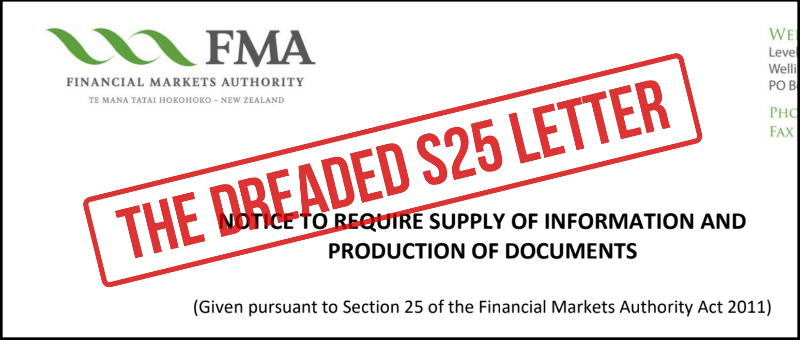
The Financial Markets Authority says it hasn't significantly increased its use of its powers to demand information in recent years.
Section 25 of the Financial Markets Authority Act gives the regulator the power to require a person to supply it with specific information or documents, while under section 44 of the Act, the FMA can also make confidentiality orders preventing that person from disclosing the information, or even the fact of the confidentiality order itself, to anyone other than their own lawyer or the FMA.
According to law firm DLA Piper, “we are seeing an increase in the number of clients receiving notices from the FMA under section 25,” and these notices are “almost invariably” accompanied by a confidentiality order.
“The penalties for breach are severe and can include a criminal conviction and fine of up to $300,000,” DLA Piper says.
“This means someone within an organisation may be compelled to provide information to the FMA but cannot discuss it with anyone else in the organisation (save for legal counsel),” it says.
“That can throw up all sorts of issues for organisations, including potentially conflicting duties of disclosure,” such as to directors, shareholders, or employees to their employer.
It can also cause workplace health and safety considerations - “how can staff be properly supported when they are subject to confidentiality constraints?” the law firm says.
FMA general counsel and evaluation and oversight executive director, Liam Mason, says the FMA uses section 25 “to obtain information that is necessary or desirable in order for the FMA to perform or exercise its functions, powers and duties.”
This includes for investigations or thematic reviews, especially when such reviews involving firms not licensed by the FMA, such as recent reviews of wholesale investor exclusions and into credit card repayment insurance products.
“We do not routinely use section 25 notices in our supervision of licensed firms, as we rely on co-operation from these firms under the terms of their licences,” Mason said.
But whenever the FMA does issue such notices, it “specifically considers the fairness, timeframe and reasonableness of the request” and all notices are subject to legal review before being approved, he said.
The FMA says it issued 222 section 25 notices relating to 48 matters in 2022 and that confidentiality orders were made in relation to 12 of those matters.
The figures compare with 216 notices relating to 51 matters issued in 2021, of which confidentiality orders were issued in relation to 10 matters.
In 2020, there were 188 notices relating to 44 matters with confidentiality orders issued in relation to eight matters.
And in 2019, the FMA issued 140 notices relating to 38 matters with confidentiality orders issued in relation to six matters.
“There has not been a significant increase in the use of these notices in recent years. It is also not correct that all section 25 notices are accompanied by a confidentiality order. The majority are not,” Mason says.
| « Stewart Group welcomes advisers to mid-market ACI Funds | Tough times ahead for NZ economy: Nikko economist » |
Special Offers
Sign In to add your comment

© Copyright 1997-2026 Tarawera Publishing Ltd. All Rights Reserved
Cannot help but observe that 222 notices is more than 4 per week on average.
I wonder what frequency would be considered routine? 5 per week perhaps..?